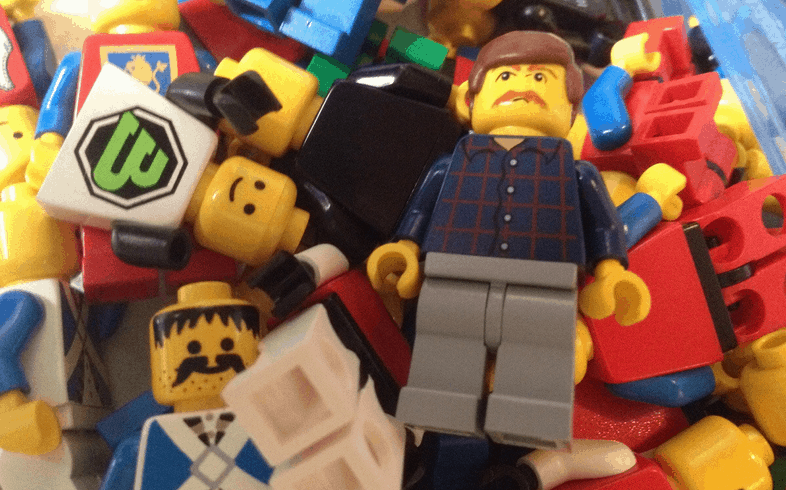
My friend Bret knows a man named Mr. Knuppe. In the 1960s Mr. Knuppe moved into his first California apartment. It was small and had no garage. He was soon frustrated by the lack of space for all his stuff, so he purchased a small industrial building and called it “Self-Storage.” People in California told Mr. Knuppe he was nuts. They said, who will ever pay money just to use a shed to store stuff? Nobody has that much stuff, they said.
In just a few weeks he rented out all the units he owned, so he opened another, then another. Soon Mr. Knuppe owned thousands of storage units up and down the California coast. He made millions by simply giving people a place to store their stuff.
We like our stuff.
Jesus used to talk about how ludicrous it was to store stuff up on earth: “Don’t store up treasures here on earth, where moths eat them and rust destroys them, and where thieves break in and steal. Store your treasures in heaven, where moths and rust cannot destroy, and thieves do not break in and steal. Wherever your treasure is, there the desires of your heart will also be.”
He is right. Our hearts follow our stuff.
Like Jesus says, storing up on earth is useless. We should have learned from the pharaohs. They built the largest storage units the world has known, but they still couldn’t take their stuff with them. Worse, it all wound up being looted by tomb raiders.
It’s the same for us. We can keep storing up stuff. We can keep the best for ourselves. We can buy the baddest car and the biggest house and the coolest clothes, but it all stays on this side of heaven. Instead, we should live simply and live generously. Because if you don’t, the Saturday morning after you die everything’s going for sale on your front lawn. Your Tommy Bahamas shirts, your Express outfit, your socket set and rusty hubcaps, your iPhone and iPad, your Sub-Zero fridge and your 65-inch 3D plasma. And whatever doesn’t sell on Saturday, your brother-in-law from Des Moines is putting on eBay on Sunday.
Hold on Loosely
I think the problem is, we try to hold on to too much. We are like the vervet monkeys of the Kalahari. When the bushmen want to catch a vervet, they carve a small hole in a gourd, drop a rock in it, then tie the gourd to a tree. From above, the curious monkeys have watched the whole thing.
As soon as the bushman walks away, the monkey scampers down the tree, crams his fist through the hole, and grabs onto the rock—but now that he has made a fist he can’t pull out his hand. As the bushman comes back to capture his prey, the monkey will scream and dance wildly, trying to break free from the gourd, but he won’t let go of the treasure in his fist—a worthless rock.
We are like that, aren’t we?
We hold on too tightly.
The psalmist writes, “The earth is the Lord’s, and everything in it.” So, ultimately, stuff is not mine or yours.
Hold on loosely.
Share Everything
The average American owns 19 pairs of shoes, three TVs, two cars and 10 credit cards. The storage unit business is a $22 billion a year industry, with more than 700 new facilities opening annually; that outpaces McDonald’s. I guess we like our junk even more than our junk food.
I invite you to pause here and consider something a little fanatical—40 Days of Simplicity. Over the next 40 days, would you be willing to buy less and give more? A Lent of sorts.
My challenge to you for this period of time is to stop buying more clothes, more electronics, more home décor, more golf clubs—more of anything that you and your family do not need to survive. And each day over the same 40 days, find something to give away.
Because the truth is we all live with excess. Our closets, garages and storage units have an excess of T-shirts, appliances, computers, sports equipment, tools, furniture and shoes.
I say all of this with the hope that we will realize we don’t need so much stuff and that these 40 days will turn into an entirely new lifestyle.
De-clutter your life.
Live with less.
Share more.
When I hear Christians say things like, “I can’t help (in places like Haiti); I’m broke,” I wish their eyes would open to how much they really do have to give. The truth is, we have a hundred times as much as most others in the developing world. We are a blessed people.
We can’t share much, though, if we are keeping so much for ourselves. That’s why Jesus kept saying to live simply. “You cannot become my disciple without giving up everything you own.”
I think many of us forget that the best life is the generous life. The most fortunate life is the life lived for the good of others. When you give your stuff—and your life—away you become the blessed one.
Jesus was right when He said, “It is more blessed to give than to receive.”
Store it in Heaven
The best place to store your stuff is heaven.
That’s what Mr. Knuppe has started to do. He’s now in his seventies and has begun to give away more than he keeps. My friend Bret is a church planter in Las Vegas. His new church needed to move out of a strip-mall and into a church home. Bret knew Mr. Knuppe well enough to ask if he would lend the startup money they needed to build—$11 million!
Mr. Knuppe gave them the loan.
When they started building, I asked Bret, “That’s a pretty big loan. How much interest are you paying?”
“I don’t know,” Bret answered. “Mr. Knuppe never said much about interest.”
“Well, what are the terms then? When do you have to pay him back?”
“I don’t know,” Bret said again. “He never mentioned that either.”
I’ve often wondered why Mr. Knuppe isn’t so interested in interest or when he will get his money back. I think it’s because he’s more interested in treasure in heaven than treasure in storage units.
This article is adapted from Barefoot Tribe. Excerpt provided by Howard Books / Simon & Schuster






















